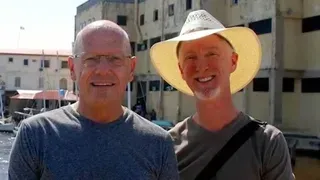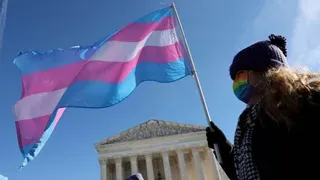May 10, 2014
Peltier Recognized for Peer Support Work
Kilian Melloy READ TIME: 5 MIN.
A gender non-conforming young adult from northern California was recognized this week for their work helping other youth in troubled times.
Eureka resident Qaiel Peltier was one of found people recognized at the May 6 event hosted by the Substance Abuse and Mental Health Services Administration just outside Washington, D.C. The SAMHSA event coincided with National Children Mental Health Awareness Day and the importance of focusing attention on children's health from birth onward.
Peltier, 23, prefers the pronoun "they" and said the key to creating healthy youth in communities requires peer advocacy and peer support groups to help youth thrive in their communities.
Peltier was at the Tuesday event, held in conjunction with the National Council for Behavioral health's annual conference, that included an appearance by New York City Mayor Bill de Blasio; his wife, Chirlane McCray; and their daughter, Chiara de Blasio, who recently went public with her own mental health and addiction struggles.
A few days before the event, Peltier sat quietly at their kitchen table in Eureka, appending rhinestones to brooches as gifts to give to their friends in the Eureka chapter of the Sisters of Perpetual Indulgence. The group, which Peltier has been a member of for four years, had recently had a death in the family and they were planning to attend a memorial later in the day. Peltier said that involvement with the Sisters and other queer-positive groups in the area had helped them to get over the stigma of being queer in rural California.
"I grew up near here in McKinleyville, where it really wasn't okay to be out," Peltier said. "When I was a kid, this whole area was pretty rural and close-minded about queer people. Some things have changed and some haven't but I have been out here for most of my life."
Growing up, Peltier felt very strongly that they were a girl, but said that reading about gender issues on the Internet helped to empower them that it was possible to be neither a girl nor a boy, but to be gender-queer and perhaps "something in between."
"Gender non-conforming means that I'm a transgender person but that I'm not necessarily conforming to one gender role or another," Peltier said. "I try in my gender identity to represent for all transgender youth."
Peltier felt called to be a pagan as young as the fifth grade, exploring Gardnerian magic and trying to rectify the duality between god and the goddess, and wishing to embody both.
"Gender non-conforming is a wide open area of exploration where there aren't a lot of scripts to draw from in order to determine what my lived experience should look like," Peltier said. "I look at other people in the 'gender outlaw' world, and wonder to myself, 'Am I Kate Bornstein? Am I Justin Vivian Bond?' The reality is that I am neither of those people, and even though I can draw on their experiences as gender queers, I really have a place of experimentation that is uniquely my own."
Perhaps it's this kind of open-mindedness and ambiguity about fixed ideas of the self that helps to inform Peltier's work as the peer advocate for the Humboldt County Transition Age Youth Center, the position for which they were honored at the SAMHSA event.
Like many within the LGBTQ community, Peltier sees that the population of LGBT young people is particularly at risk for depression, self-harming, substance abuse, and suicide. Peltier has had some of these issues, but has discovered that there is more work to be done in order to build community and help others from falling into the same desperation.
"When I was younger and living outside of Arcata, I had my fair share of bullying and hassling for being a queer youth," Peltier said. "Arriving at [Humboldt State University] was like finding a safe harbor, and I thrived there for awhile until some of my friends - queer and trans - began to commit suicide."
Around this time, Peltier was asked to participate in a youth summit put on by the Humboldt County Department of Human Services to help address the needs of all youth. Soon after, Peltier was asked to join the youth advisory board and later was asked to become an advocate for youth as an employee of the county in December 2012.
"I hadn't yet graduated from HSU," Peltier said. "The stress of the deaths of those around me - including my very close friend Chloe, a transwoman, as well as a drug overdose and hanging suicide of other friends, caused my grades to plummet. Prior to those incidents, I had been an excellent student, but I began to undergo stress that led to a resurgence of my own mental health issues."
These issues continue to affect Peltier, but working as an advocate keeps them at bay.
"I think that once depression and self-harming become a part of you, they're never very far away as options," Peltier said. "Today I have better coping skills, but I also have regular employment and a place to be everyday that creates continuity and allows me to carry on."
Back at the kitchen table, Peltier put the finishing touches on the brooches for the Sisters. According to Peltier, the Sisters are "a band of 21st century queer nuns who enact a ministry of habituation manifestation" in partnership with the Sacred Clown. Peltier joined the Sisters around the time they began acting as a youth advocate, and said that both roles have helped to bring them a sense of self that allows them to move forward and help others.
"My day-to-day life at HCTAYC includes coming up with programs for youth, plus meeting with youth who may be in crisis and need someone to talk to," Peltier said. "Oftentimes youth are in crisis and they need a friendly face to help them see that there are options and other things they can be doing to improve their circumstances."
Other tasks that Peltier is involved with include designing and implementing trainings for other advocates such as case workers, case managers, social workers, and others who may not be entirely familiar with the myriad issues that young people face.
"What not everyone realizes is that young people are experts in their own lives and we should have the ability to have a say in our lives," Peltier said. "We should have a say in our treatment plans and where the money that goes toward our well-being is spent."
Peltier believes that peer support and advocacy is a vital resource for youth wellness that is often under-utilized and untapped. They find it ironic that evidence-based studies are now showing that community building tactics like peer support groups are often the best deterrent to the problems that affect at-risk youth and adults.
"My plan for the future is to continue my work and also to finish my degree, perhaps through HSU's online program," Peltier said. "And I plan to stay in this area and continue to be of help and service, to make it better for young people so that they don't have as hard a time as I did being queer here."
Kilian Melloy serves as EDGE Media Network's Associate Arts Editor and Staff Contributor. His professional memberships include the National Lesbian & Gay Journalists Association, the Boston Online Film Critics Association, The Gay and Lesbian Entertainment Critics Association, and the Boston Theater Critics Association's Elliot Norton Awards Committee.






